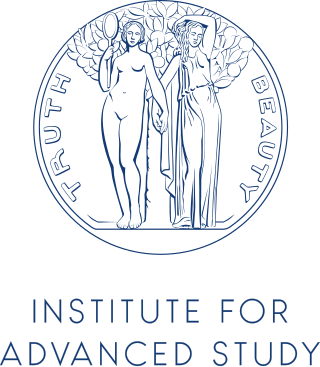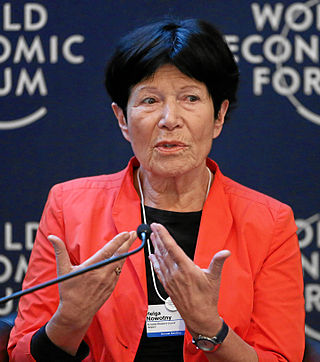Related Research Articles

École Centrale de Nantes, or Centrale Nantes, is a grande école – a French engineering school – established in 1919 under the name of Institut Polytechnique de l'Ouest. It provides Bachelor, Graduate, Master, and PhD Programmes based on the latest scientific and technological developments and the best management practices.

Postgraduate education, graduate education, or graduate school consists of academic or professional degrees, certificates, diplomas, or other qualifications usually pursued by post-secondary students who have earned an undergraduate (bachelor's) degree.

The Institute for Advanced Study (IAS) is an independent center for theoretical research and intellectual inquiry located in Princeton, New Jersey. It has served as the academic home of internationally preeminent scholars, including Albert Einstein, J. Robert Oppenheimer, Hermann Weyl, John von Neumann, Michael Walzer, Clifford Geertz and Kurt Gödel, many of whom had emigrated from Europe to the United States.

The Free University of Berlin is a public research university in Berlin, Germany. It was founded in West Berlin in 1948 with American support during the early Cold War period as a Western continuation of the Friedrich Wilhelm University, or the University of Berlin, whose traditions and faculty members it retained. The Friedrich Wilhelm University, being in East Berlin, faced strong communist repression; the Free University's name referred to West Berlin's status as part of the Western Free World, contrasting with communist-controlled East Berlin.

Robertus Henricus "Robbert" Dijkgraaf, is a Dutch theoretical physicist, mathematician and string theorist, and the Minister of Education, Culture and Science in the Netherlands from 2022 until 2024. From July 2012 until his inauguration as a minister, he had been the director and Leon Levy professor at the Institute for Advanced Study in Princeton, New Jersey, and a tenured professor at the University of Amsterdam.
Bernard Wasserstein is a British and American historian.
Dame Linda Jane Colley is an expert on British, imperial and global history from 1700. She is currently Shelby M. C. Davis 1958 Professor of History at Princeton University and a long-term fellow in history at the Swedish Collegium for Advanced Study in Uppsala. She previously held chairs at Yale University and at the London School of Economics. Her work frequently approaches the past from inter-disciplinary perspectives.
University admission or college admission is the process through which students enter tertiary education at universities and colleges. Systems vary widely from country to country, and sometimes from institution to institution.

Swedish Collegium for Advanced Study (SCAS) is an institute for advanced study in Uppsala, Sweden. It is one of the ten member institutions of the Some Institutes for Advanced Study consortium, which brings together the world's most distinguished institutes for advanced study. SCAS is also a member of the European network of institutes for advanced study NetIAS.

Hans Joas is a German sociologist and social theorist.

Helga Nowotny is Professor emeritus of Social Studies of Science, ETH Zurich. She has held numerous leadership roles on Academic boards and public policy councils, and she has authored many publications in the social studies of science and technology.

The Netherlands Institute for Advanced Study in the Humanities and Social Sciences (NIAS) in Amsterdam, Netherlands, is an independent research institute in the field of the humanities and social and behavioural sciences founded in 1970. The institute offers advanced research facility for international scholars of all of the humanities and social sciences. It is a member of Some Institutes for Advanced Study (SIAS) and the Network of European Institutes for Advanced Studies (NetIAS).

The Balassi Institute is a worldwide non-profit cultural organization funded by the Ministry of Foreign Affairs (Külügyminisztérium) of Hungary. The institute spreads and promotes Hungarian language and culture abroad, and plays a key role in developing and attaining Hungary's objectives in the area of cultural diplomacy. As an organizational hub, it coordinates and directs all activities provided by Hungarian institutes abroad.
It is named after the Hungarian Renaissance lyric poet Bálint Balassi.

The Dutch Research Council is the national research council of the Netherlands. NWO funds thousands of top researchers at universities and institutes and steers the course of Dutch science by means of subsidies and research programmes. NWO promotes quality and innovation in science. NWO is an independent administrative body under the auspices of the Dutch Ministry of Education, Culture and Science.

The Israel Institute for Advanced Studies is a research institute in Jerusalem, Israel, devoted to academic research in physics, mathematics, the life sciences, economics, and comparative religion. It is a self-governing body, both in its administrative function as well as its academic pursuits. It is one of the nine members of the symposium Some Institutes for Advanced Study (SIAS).
Suzanne L. Marchand is an American intellectual and cultural historian of modern Europe. She is the Boyd Professor of European Intellectual History at Louisiana State University.
The name Institute for Advanced Study or sometimes Institute of Advanced Studies is used by various research institutions around the world. They include:
Salem Mekuria is an Ethiopian-born independent filmmaker, video artist and educator living in the United States.
The Joint Entrance Screening Test (JEST) is a national entrance test in physics and theoretical computer science conducted annually in India. The test is utilised by various Indian public research institutes to shortlist candidates for admission to PhD and Integrated PhD programmes with fellowships in theoretical computer science and areas in physics. JEST has been recognised as a National Eligibility Test (NET) by the Science and Engineering Research Board (SERB).

The Institute for Advanced Study at Central European University, previously known as Collegium Budapest, is a research institution in Budapest, Hungary.
References
- ↑ Swedish Collegium for Advanced Study: SIAS
- ↑ SIAS Summer Institutes: 2015–2016
- 1 2 A brief history of institutes for advanced study by Björn Wittrock, Principal of SCASSS